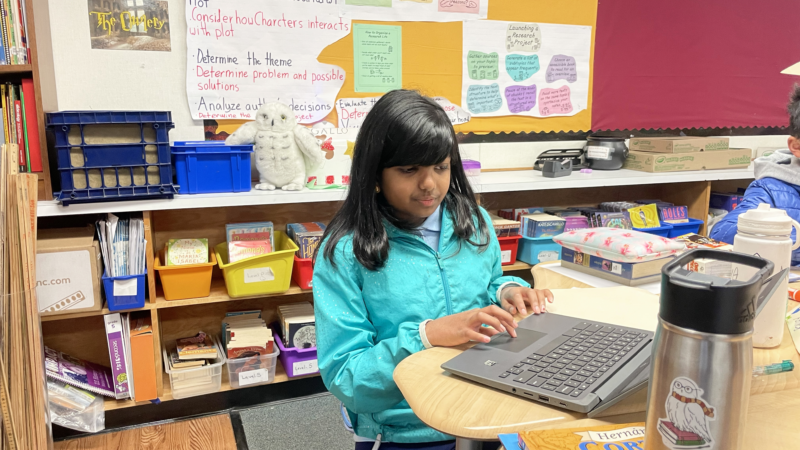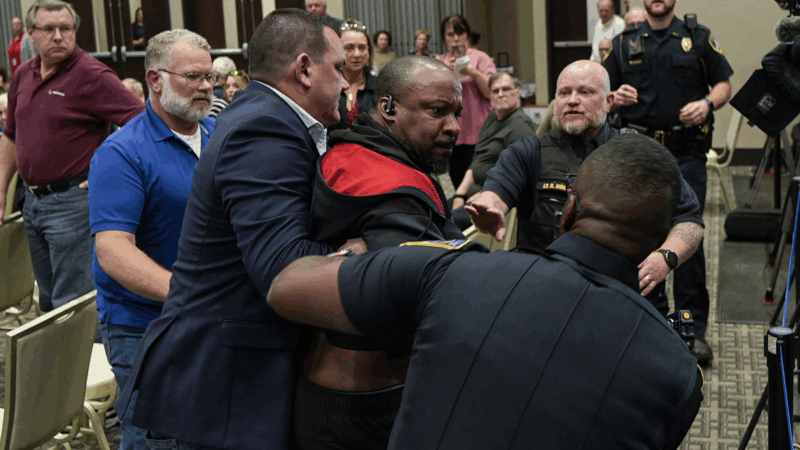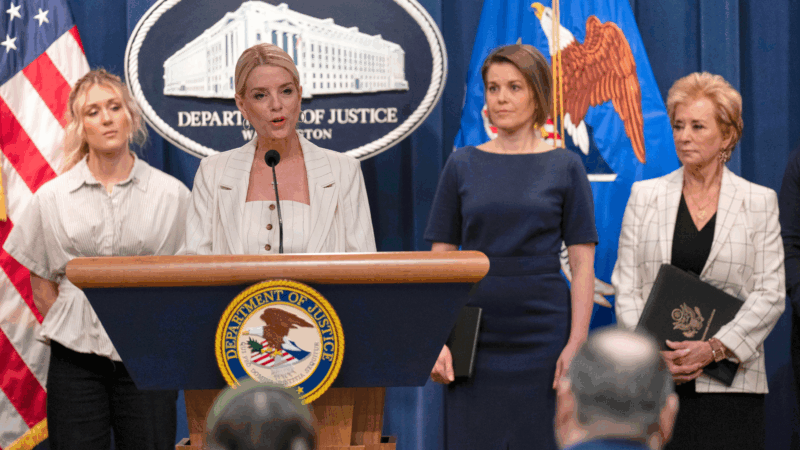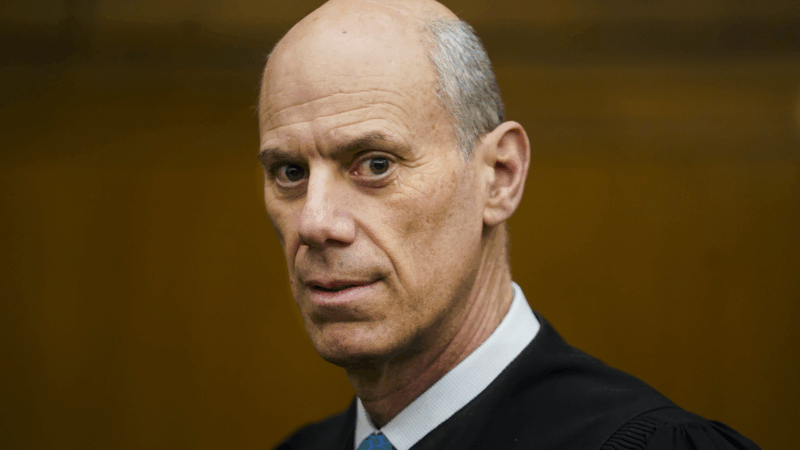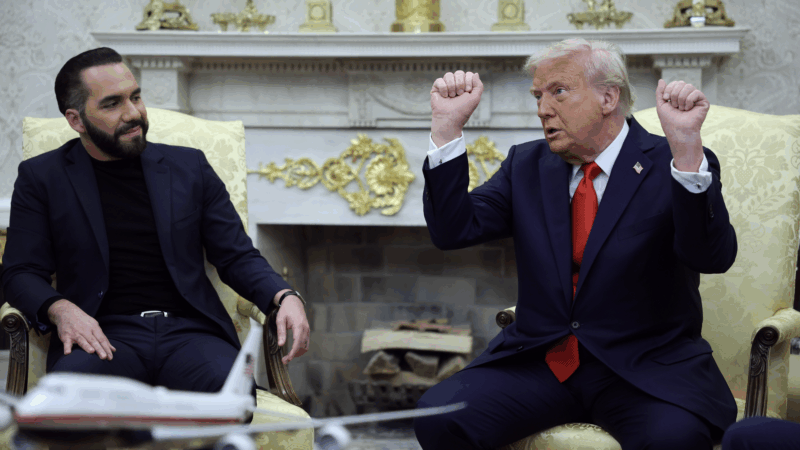A 10-year-old’s story of family immigration that spans three continents
When Ameya Desai started elementary school, she would pester her dad every morning on their drive to class.
“Daddy, you owe me a story,” the 10-year-old would demand. “And then he’s like ‘what for?’ Because I’m your daughter,” she recalls with a giggle. “You have to tell me a story!”
So her dad, Nikhil, came up with a series of tales, sequels, then prequels, that he shared with Ameya one chapter at a time. “When I drop her off to school, I’d say, ‘to be continued’.”
The father-daughter duo sits next to each other at the dining table at their home in San Jose, Calif. They constantly exchange eye contact and loving giggles throughout dinner.
“That’s my daughter to a T,” he tells us. “She loves stories.”
So it’s no surprise that Ameya wanted to tell some of her own. One she shared in a podcast last year was among the fourth grade winners of NPR’s Student Podcast Challenge.
In her award-winning entry, Ameya interviews her grandfather, Kishor Desai, whose family migrated from India to Uganda, where Kishor was born and raised. His father worked at a sugarcane factory outside of Uganda’s capital, Kampala.
“Sugarcane fields stretched for miles all around,” Kishor told Ameya for her podcast. “We used to play a lot of sports by the side of sugarcane fields,” he says. “And any time one was hungry or thirsty, we just broke a sugarcane and chewed on it for an instant sugar rush.”
But Kishor’s life was completely turned around when he was in college. In the summer of 1972, Uganda’s leader, Idi Amin, ordered the mass expulsion of Asians. Kishor suddenly had 90 days to leave the country.
“I was in shock and disbelief,” he says. “My family was dispersed all over the world. We were never a single family unit again.”

Kishor was stateless for years while he finished his studies. He then migrated to the United States, where he had to start all over again. That journey across three continents became the subject of his granddaughter’s podcast.
At the end of her episode, Ameya says she wants to keep telling stories of displacement like her grandfather’s – stories that don’t get told enough. “I think when we share the pain and suffering of our history, we can ensure it doesn’t happen to others.”
The project also brought the Desai family closer. Grandfather Kishor says over the phone that listening to Ameya’s work made him feel “totally taken aback.”
Her dad, Nikhil, adds that he, too, learned new details about his father’s life.
“When I was growing up listening to your story,” he tells his father, “I only heard it in bits and pieces. But it never really came together, and this story served as the cohesion that it needed.”
Ameya is already working on her next podcast
A funny thing happened when Ameya was selected as one of NPR’s fourth grade winners. Other people came forward, wanting to share their stories with her.
When we visited Williams Elementary School, Ameya was presenting her fifth grade research project. The topic she chose was the internment of Japanese Americans during World War II, a history she had recently learned from one of her neighbors.
Their grandmother, Linda Horikawa, was only 4 years old when her family was forced into the internment camps. Horikawa told Ameya stories from more than 80 years ago, many of which she had mostly kept to herself.
“Miss Linda said, ‘My father carried a crib in each arm for me and my sister,'” Ameya shares with her class. “‘We never knew where we were going or if we would even have a bed’.”

This willingness to learn and expand her world is what makes Ameya not only a competent student but also an amazing human, says her homeroom teacher, Melissa Gallo:
“She realizes that there’s this greater world out there, and she doesn’t know it all. She has learning and growing to do, and is willing to do that.”
With additional research from the Japanese American Museum of San Jose, Ameya is turning her interview with Horikawa into her next podcast. She says she’s worried this history will be lost when the older generation is gone.
“It’s important that we learn about the people who have lived through the experiences of war, not necessarily at the battle on the battlefield, but here at home.”
Like any good journalist, Ameya is looking at the world around her for more stories. “Because that just lit up a spark in me,” she says.
“You should always listen to that spark, because that means that you’re doing the right thing.”
You can listen to Ameya Desai’s award-winning podcast, Far From Home – A Story of Forced Migration, here.
The FDA warns patients about counterfeit Ozempic that may be in circulation
The agency and Novo Nordisk, which makes Ozempic, said Monday that they had learned about "several hundred units" of the drug that made it onto the market outside the company's approved supply chain.
In the middle of a hepatitis outbreak, U.S. shutters the one CDC lab that could help
All 27 scientists at the CDC's viral hepatitis lab were told their duties were "unnecessary." Ongoing outbreak investigations have now been halted.
Protesters were stun-gunned and arrested at Marjorie Taylor Greene’s town hall
By the end of Greene's Tuesday town hall in Acworth, Ga., three people were arrested and two were hit with stun guns. Greene is one of many lawmakers confronted by angry constituents in recent weeks.
Trump administration says it is suing Maine over transgender athletes in girls’ sports
The DOJ says Maine is violating Title IX, the 1972 law that prohibits sex-based discrimination at schools that receive federal funding. Gov. Janet Mills has promised to "vigorously defend" the state.
Judge: ‘Probable cause’ to hold U.S. in contempt over Alien Enemies Act deportations
The government sent several planeloads of alleged gang members to El Salvador, including 137 people under the act, the White House said at the time. The judge gave the U.S. until April 23 to respond.
‘Homegrowns are next:’ Trump hopes to deport and jail U.S. citizens abroad
Trump hopes to deport and imprison U.S. citizens abroad. Critics say the concept is unconstitutional and dangerous.

